Our testimony about the state of the Hungarian media before the LIBE committee of the European Parliament
Ladies and gentlemen, members of the committee: my name is Peter Erdelyi, i'm a reporter and editor with the Hungarian news portal 444.hu.
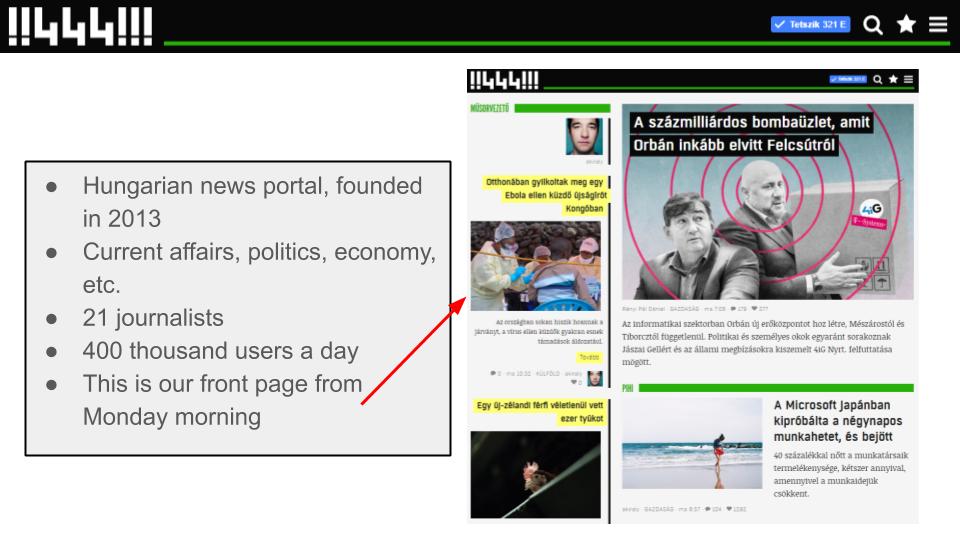
We have around 400 thousand visitors a day, mainly cover public affairs, and we won multiple awards for our investigative journalism.
Let me start by showing you a few pictures.
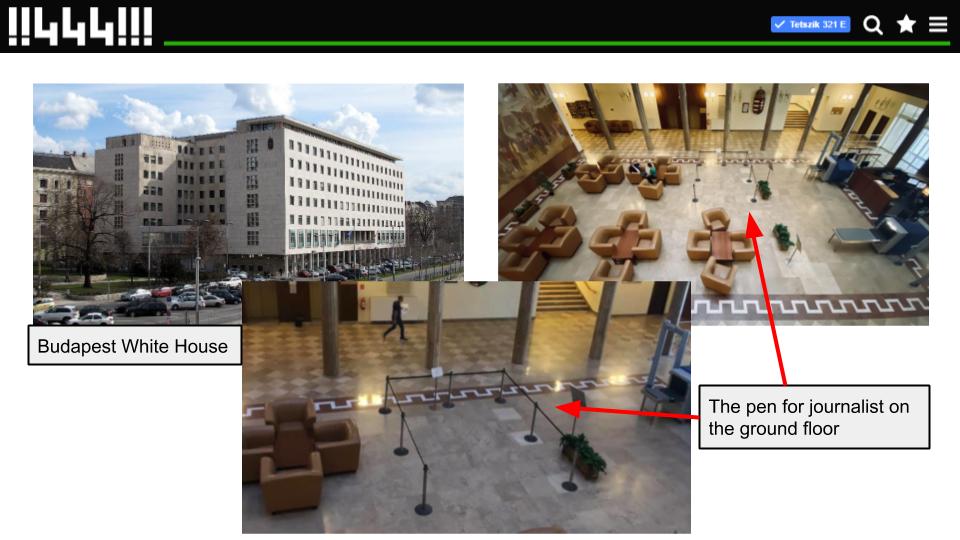
On the left is the Hungarian Parliament’s office building, where all of the MPs work and on the right and bottom is the ground floor of that building with a 10 square meter pen in the middle. That's a recent addition. A few weeks ago the Speaker of the House designated this area for journalist. A similar pen was set up in the Parliament building. Reporters are no longer allowed to interview MPs practically anywhere else in the buildings of the National Assembly.
Asking questions outside the parliament has its own challenges.

László Tasó, a Fidesz MP had local police investigate journalists for harassment, after they asked around in his hometown following a story about his hidden assets. When a german camera crew traveled to Felcsút, to report on the hometown of PM Orban the local police showed up, checking IDs, patting down journalists. We got our first drone confiscated there.
The digital path is no easier: emails sent to Fidesz politicians, government officials and institutions are almost always ignored. Prime Minister Orban has not given an interview to an independent Hungarian media outlet in over 5 years.
Before Fidesz took power in 2010, Hungary had one of the most progressive freedom of information laws in Europe.
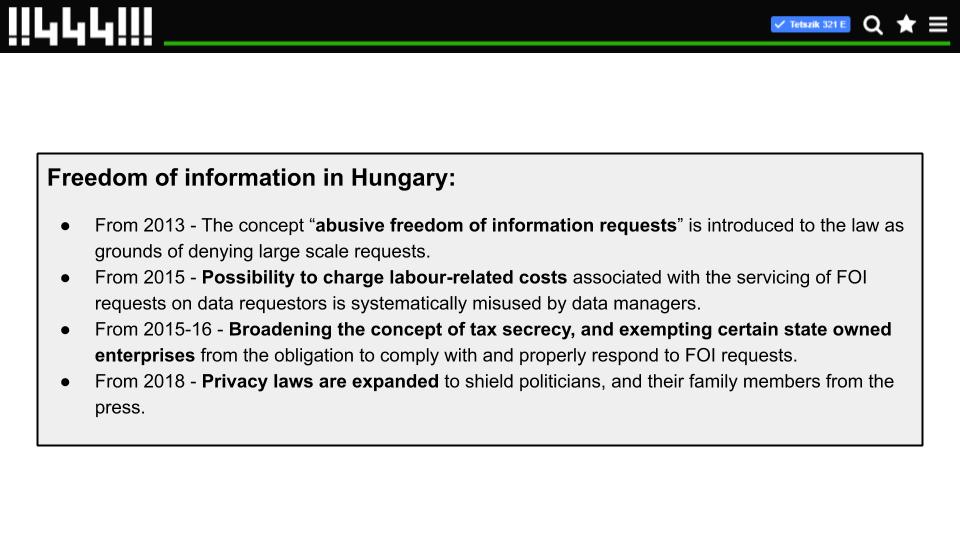
After journalists used FOI requests to uncover corruption, the laws were changed to the point where now state institutions are allowed to charge thousands of euros just to determine if they are able to comply with requests.
The Supreme Court recently ruled that Istvan Tiborcz, the billionaire son-in-law of PM Orbán and recipient of massive EU funds is NOT a public figure, and based on that ruling, his lawyers already petitioned us to remove an article about him.

Over the past nine years public affairs have gradually become the private matter of people with power, and every relevant law, regulation and practice echoes this perspective. Regime officials and politicians treats journalists asking them questions as if we were invading their privacy.
Independent journalism is under literal threat.
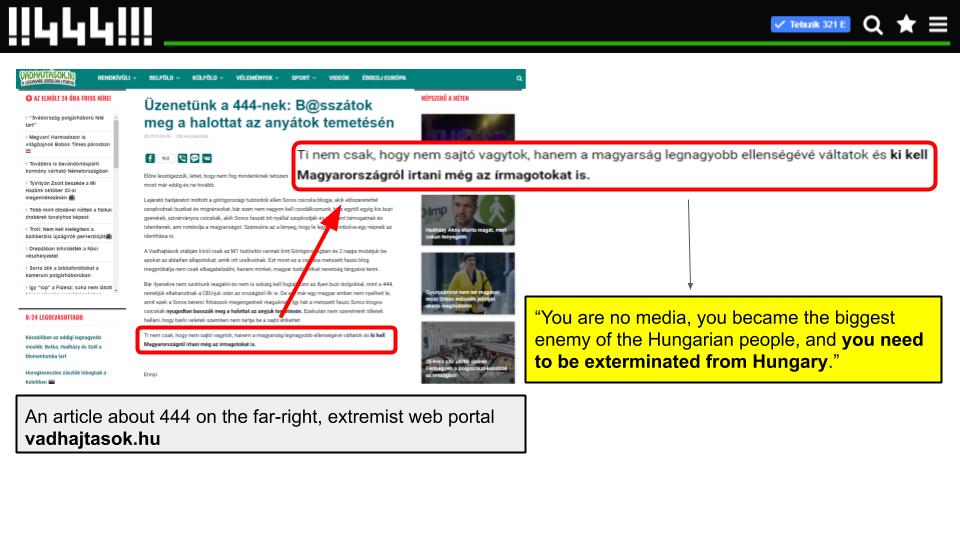
This is a post from a far-right publication about the newspaper I work for. Its openly anti-semitic, xenophobic, homophobic. The last sentence reads:
„You are no media, you became the biggest enemy of the Hungarian people, and you need to be exterminated from Hungary.”
Every country has violent extremists. The difference in Hungary is, that currently sitting government MPs use their official Facebook pages to share the posts of this extremist site.
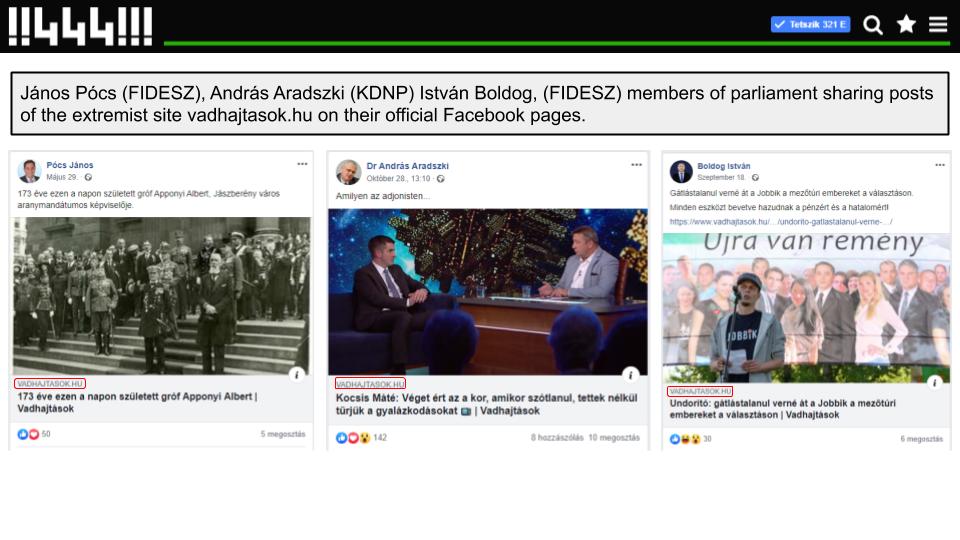
As public affairs are privatized so are violent threats and extremist behaviour, which is outsourced but still condoned.
Unfortunately there is intimidation from the authorities as well. In the most notorious case, a fellow Hungarian journalist was approached by members of the secret service. They showed him photos of his private life, claiming someone else might try to blackmail him with the pictures, and told him he needed to work with the government in order to be protected.
While moving against independent media, the government also built up their own empire.
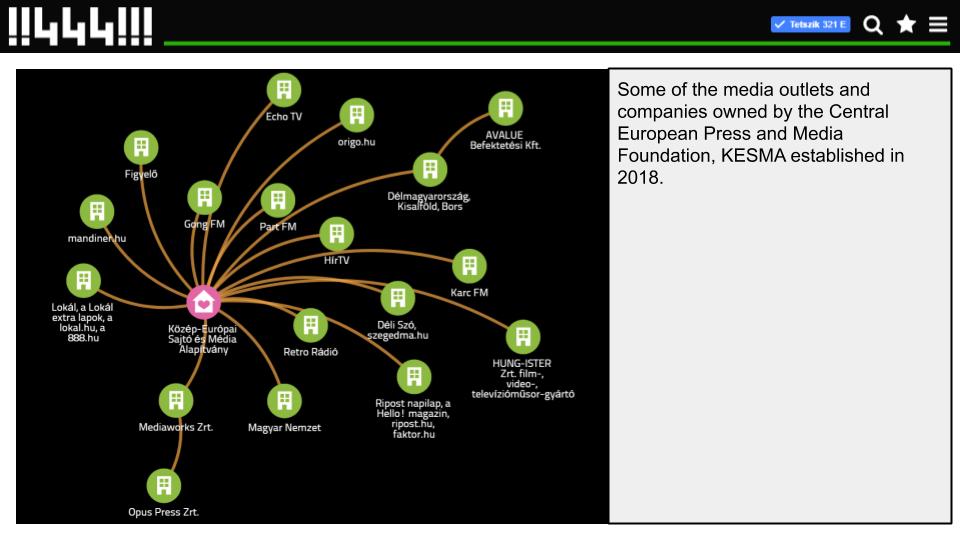
Almost exactly one year ago, billionaire owners of over 400 media outlets suddenly all decided to gift their entire media portfolio to the Central European Press and Media Foundation. A week later PM Orban signed a decree exempting this mega merger from regulatory oversight.
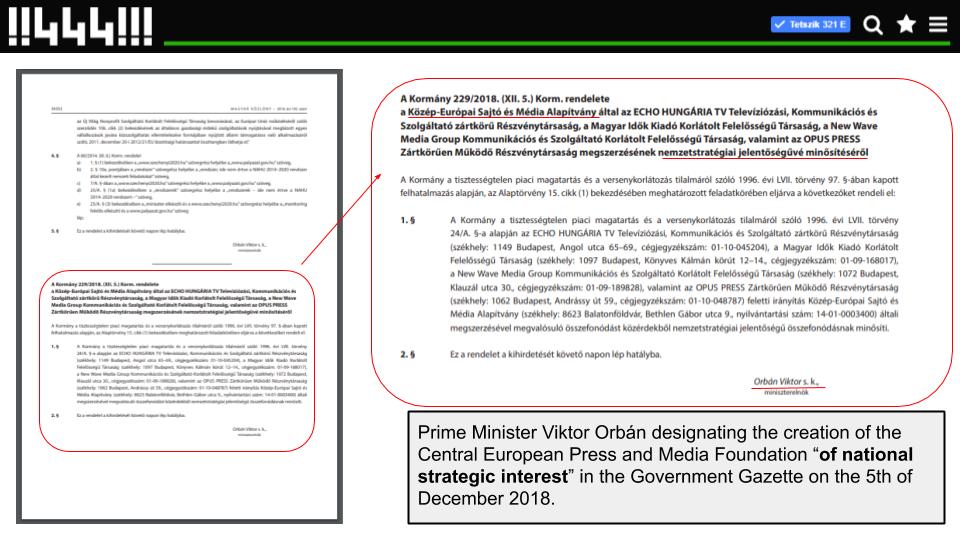
This is an unprecedented centralization of tv and radio stations, news portals, print magazines and newspapers.
A few months after the foundation was created, and one day before the May 26th European Parliament election this is how the front pages of every single regional newspaper in Hungary looked like.
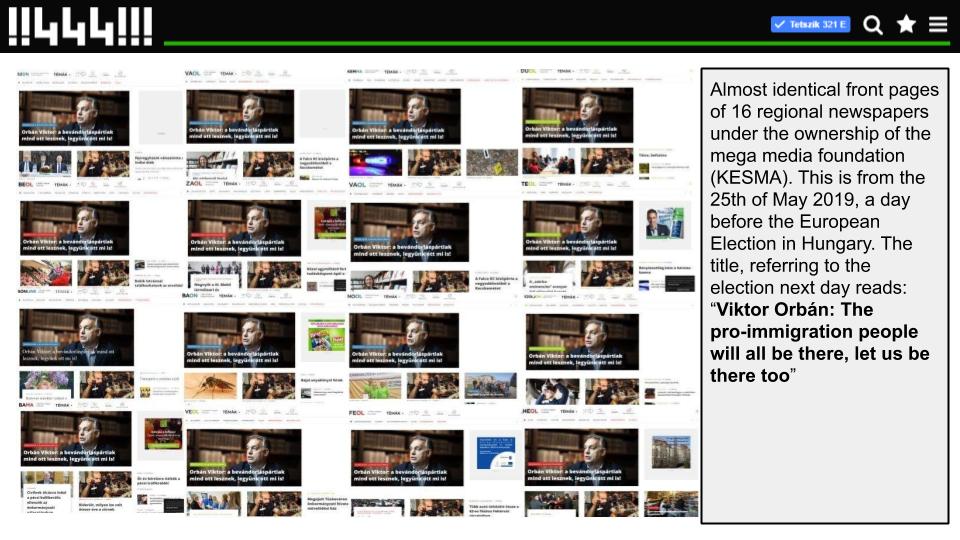
The tile, referring to the election next day quotes PM Orban:
„The pro-immigration people will all be there, let us be there too”
This mega media machine is indirectly funded by the taxpayers. According to the Hungarian Advertising Association, the state is the single largest advertiser in Hungary. It's not the automakers, not banks, not the telecom companies. It's the government with their campaigns about the evils of Brussels, immigration and so forth.
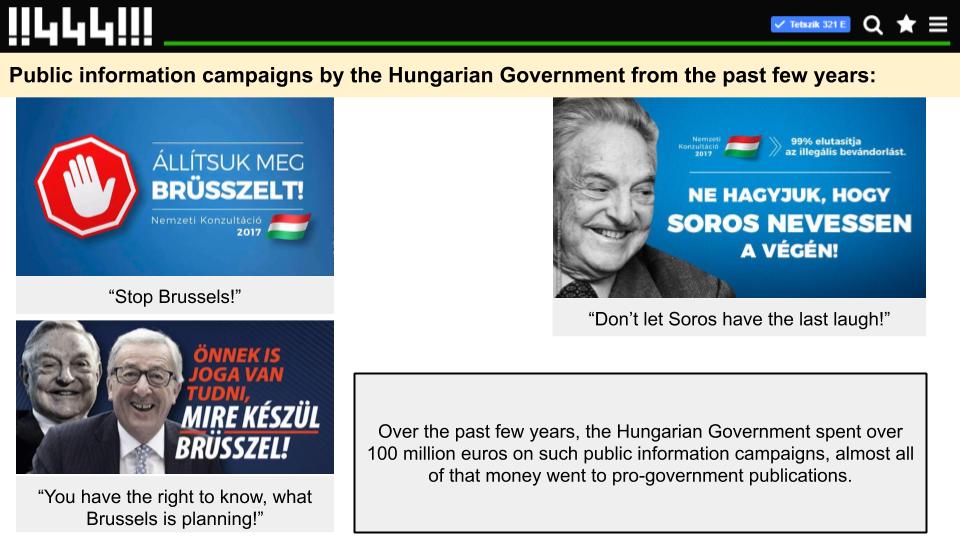
Over the past few years, they spent hundreds of millions of euros on advertising and they almost exclusively advertise with pro-government outlets.
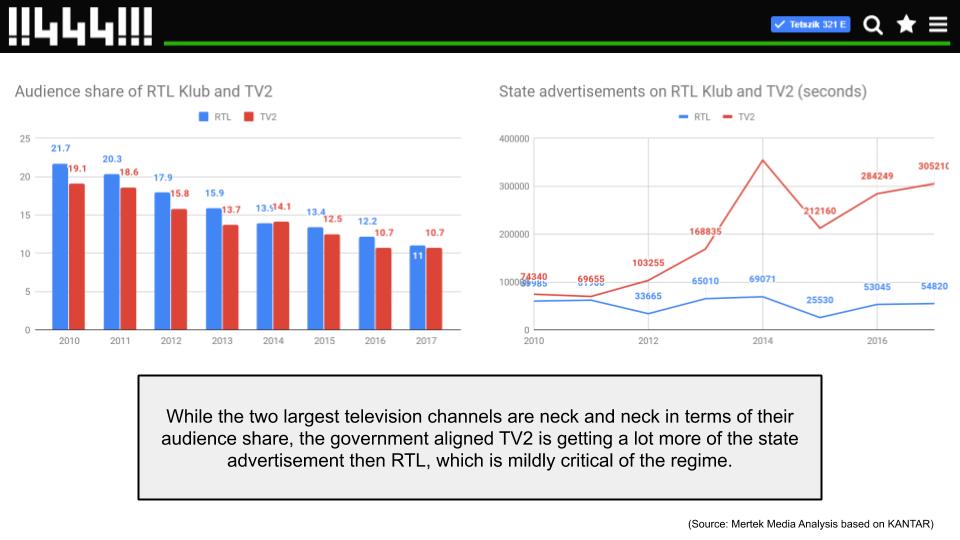
On the left you see the audience share of the two largest tv channels in Hungary, the govt aligned TV2 (in red) and RTL (in blue) which is mildly critical of the regime. They are neck and neck in terms of viewers. And on the right is their share of state advertisement. I think it's not too difficult to tell which channel is favored by the government, right?
Privately owned companies are also very cautious about where they advertise not wanting to upset the government. This is how they starve independent media.
And the taxpayers pitch in even more. The 2020 budget for Hungary’s “public service” media (and I really can't put enough air quotes around “public service” for this, so im going to use the term state media instead) was announced last week, it is going to be 232 million euros.
According to a former reporter of the broadcaster, who quit recently due to political interference, there are clear instructions to only show the opposition in a negative light.
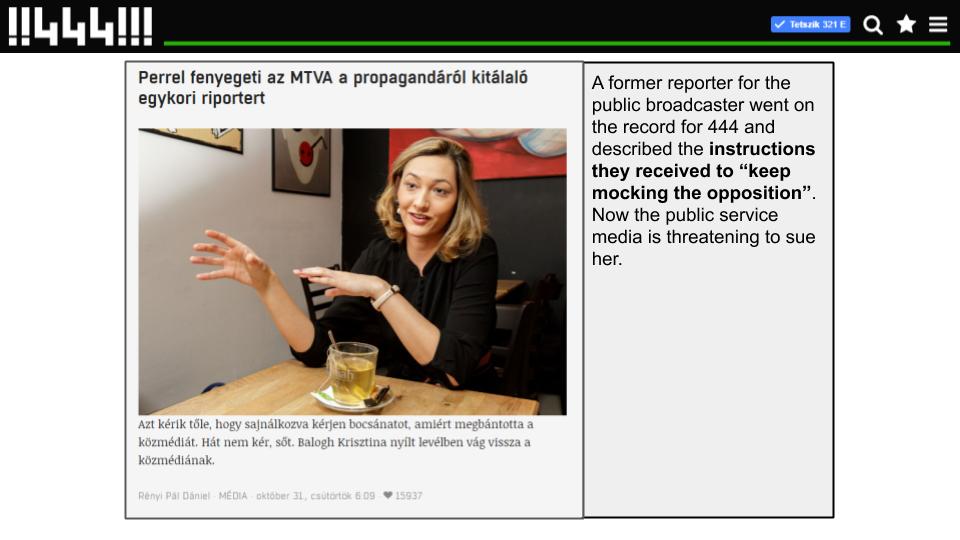
During the election season, the state broadcaster is legally obligated to give 5 minutes of airtime to each party, but outside of this period, opposition politicians cannot set foot in their studios. They are never ever invited to interview programmes, talk shows, etc.
Last December, a group of opposition MPs staged a sit in, spending the night in the makeup rooms to protest of this situation.
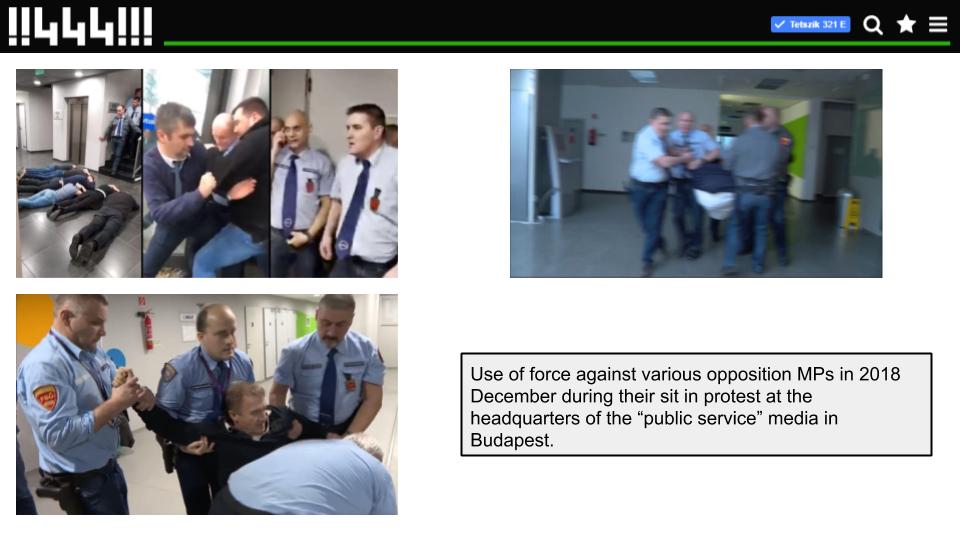
Some of them were forcibly thrown out despite their immunity, and they just recently won the first court case against the state broadcaster over this.
The Hungarain state media is probably the most important conduit for Russian propaganda in Hungary. They regularly base their coverage of foregin affairs on RT and Sputnik, the two most influential Russian state media organs.
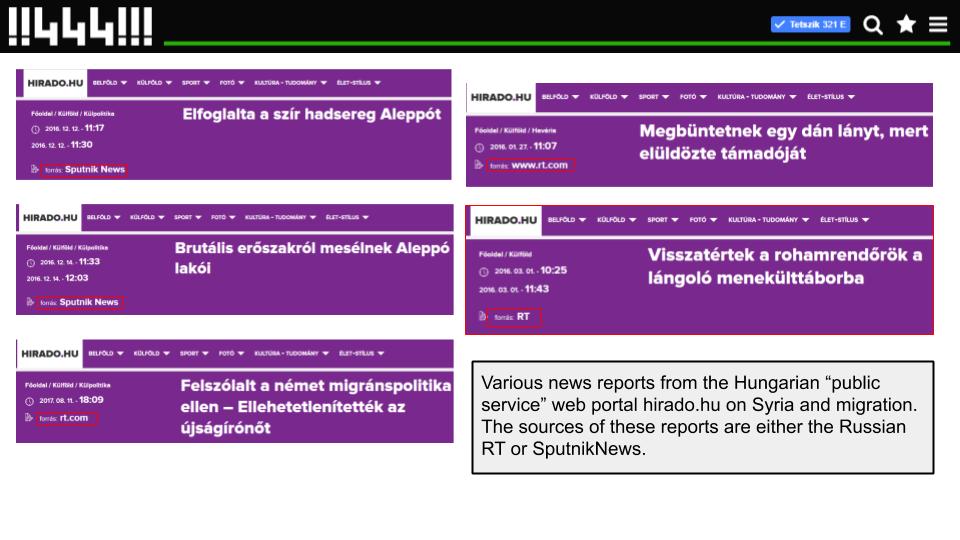
And let me tell you one story about TV2, you know the big pro-government TV station that is getting a lot of state money. On the 12th of September, 2018, the European Parliament voted on the Sargentini report. TV2 spent over 10 minutes on this during their nightly news program. Fair enough, it was big news in Hungary.
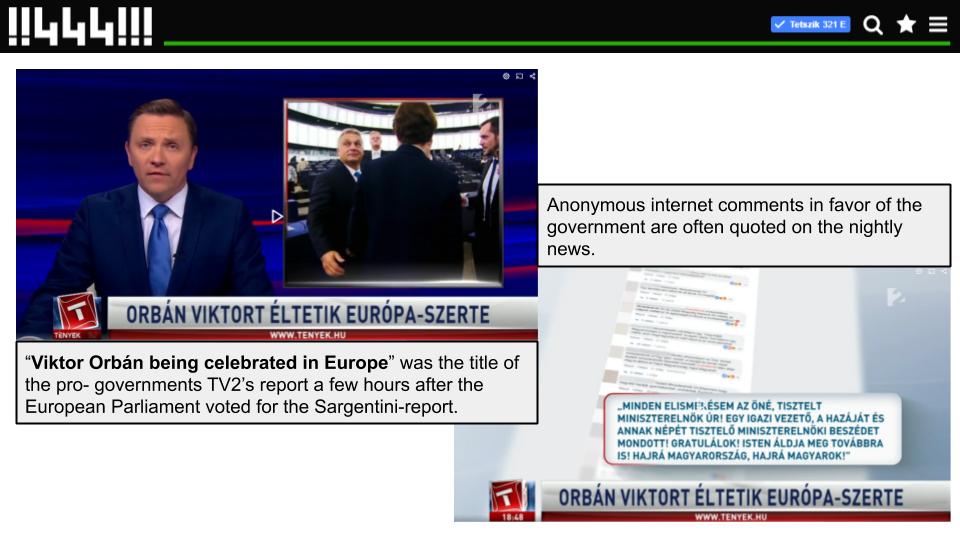
The presenter began with this sentence:
„All across Europe, Viktor Orban is being celebrated in social media. Despite the European Parliament adopting the Sargentin report critical of Hungary, it is the Hungarian prime minister who achieved success.”
Over the course of 10+ minute broadcast, viewers heard 12 pro government opinions, including the prime minister’s, the foreign minister’s, 3 Fidesz MEPs and even pro govt anonymous commenters were quoted.
This left no time for the opposition, the only reference to them was this sentence:
„of the Hungarian opposition some MEPs voted against Hungary”
and then they went on and listed these supposedly Anti-Hungarian people. One of the opposition MEPs mentioned by name Istvan Ujhelyi lodged a complaint with the Hungarian Media Authority, since national tv channels are legally obligated to have unbiased coverage, and he felt this was over the top even for Hungarian standards.
But the Media Authority, set up by Fidesz in 2011, did not agree. They found no bias during their first inquiry, Ujhelyi appealed, and the courts mandated a second inquiry: the Media Authority still found no bias, Ujhelyi appealed again and the Media Authority only determined the report was biased in the third round (almost a year after the original broadcast), but decided not to issue a fine.
The pro-government media machine has one more use: to smear and intimidate real or perceived opponents. After a high school student used harsh words at an anti-government rally last December, she became the target of a concentrated smear campaign, with one pro-government opinion leader calling her a whore, an outlet publishing upsikrt photos of her (for this, they later apologized), while others reported on her grades.
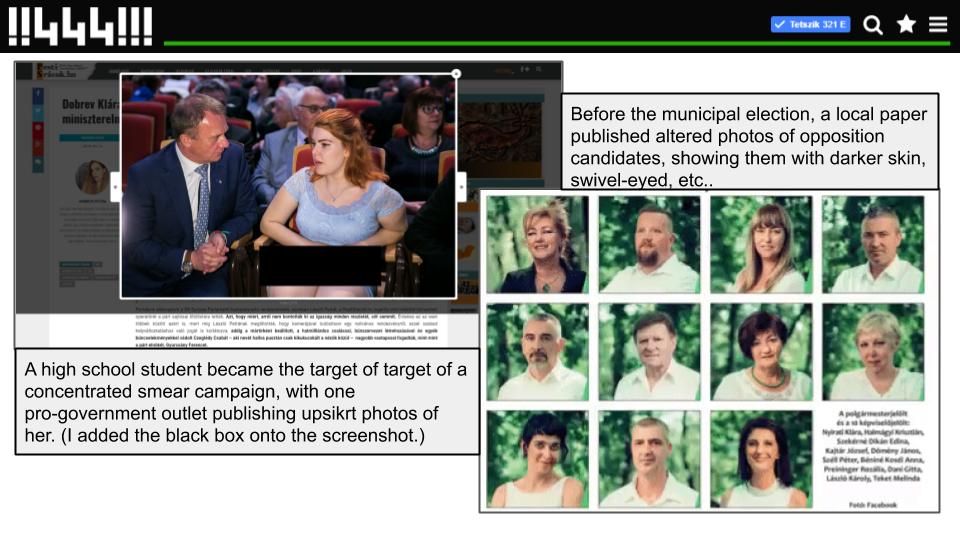
Before the municipal election, a local paper published altered pictures of opposition candidates, showing them with darker skin, swivel-eyed, etc. This was not an attempt at satire, readers were made to think this is how the opposition candidates actually looked.
These as just a few examples to illustrate the situation in Hungary. I could sit here for days and keep talking.
From my perspective, none of this is journalism. These are not right wing or conservative outlets. These weapons of mass deception in political warfare, propaganda tools under tight government control.
And they are very effective. So much so, that there is a genuine demand for export.
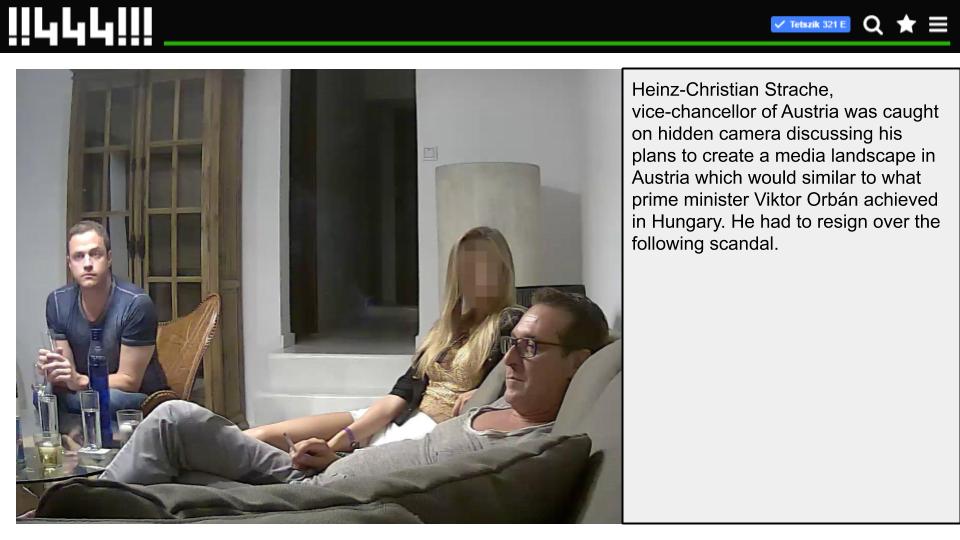
Govt aligned Hungarian business people are building similar empires in Slovenia and Macedonia, and the former vice-chancellor of Austria, Heinz-Christian Strache was recorded talking about how he wants to see something similar in Austria.
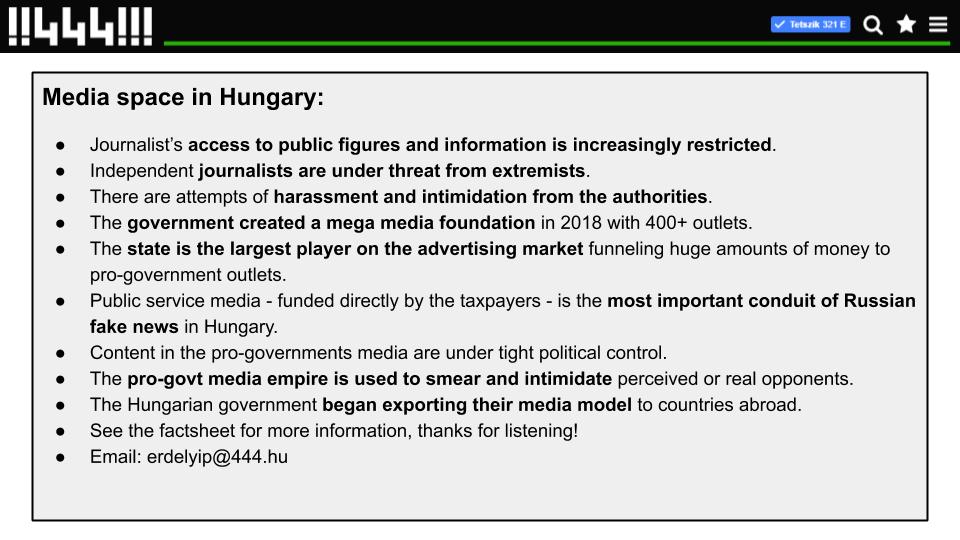
There are many countries in the world, where its a lot more difficult and dangerous to be a journalist, no doubt about that. But this, what I was telling you about, it’s not happening somewhere else. This is present day Hungary, a member of NATO and the European Union. And it might sound alien and maybe even unthinkable to you, but I can assure you, it can happen in your country too. Thanks for listening!

